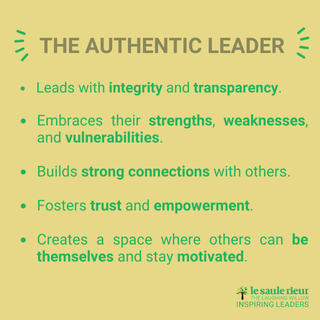| Dear leaders, |
| This month, we're focusing on authentic leadership - creating trust, meaningful connections, and long-term success. In this edition of Inspiring Connections, we'll explore how staying true to what you believe in can be a powerful way to stay authentic. Ready to embrace your authentic leadership? Missed a previous edition? Catch up here. Received this from another leader and want to subscribe? Click here. |
This month's nugget
How can you develop the authentic leader within you?
Being authentic isn't about being perfect - it's about being real. It's about knowing who you are, what you stand for, and leading in a way that reflects your values.

💭 What makes you, you, as a leader? Take 15 minutes this week to reflect on your leadership journey. Here's how:
- Start a conversation: in your next team meeting, share your leadership "why" and ask team members to reflect on theirs.
- Identify your core values: write down 3-5 values that matter most to you. These are your guiding principles as a leader (e.g., honesty, empathy, courage).
- Reflect on your leadership moments: think about a time when you felt truly aligned with your values as a leader. What happened? How did it feel?
- Ask yourself "why do I lead?": consider this question deeply: What impact do I want to have on the people I lead and the world around me?
- Write your leadership "Why" statement: in one or two sentences, summarize your purpose as a leader. For example: "I lead to create a space where others feel empowered to be their best selves and make meaningful contributions."
Leadership nudges
Standing true to your values
When I listened to this interview, I found the word defiance to be quite strong.
In the pursuit of authenticity, defiance can play a key role. It's about standing true to your values, even when it's easier to comply with the status quo.
Prof. Dr. Sunita Sah shares with us her takeaways explores to cultivate your defiance:
- Know your valuesAsk yourself if a situation goes against what you believe. Saying "no" isn't just about refusal - it's about saying "yes" to the world you want to create.
- Defiance is a skill: standing up for yourself is something you can learn. Practice speaking up and prepare for moments of pressure.
- Leaders set the toneManagers should encourage feedback, create a safe space to say "no," and share tasks fairly.
- Think beyond complianceBlind obedience has caused more harm than thoughtful rebellion.
You may recall in my December edition John Harney's inspiring note on this.
Note from an inspiring leader
Meet Philippe Fardel
| Very soon after starting to work with Philippe, I found his fundamental value to be trust. A leader who walks the talk. I also found him to lead his team to exceptional results, which when you are in the FMCG sector is not so easy. When highly effective teams succeed together it is thanks to the trust that they have in each other. The trust that welcomes vulnerability. The other qualities of a highly effective team is that they can enter into healthy conflict to be able to better engage towards their common goal. They hold each other accountable to reach the results they have set out for themselves. All is not up to the leader. And Philippe, President Mousline, knows that without his team, he cannot succeed. Inspired? Connect with → Philippe |

| " Throughout my career, I've always made trust a pillar of my management. I'm an optimist by nature and I firmly believe that the vast majority of my colleagues do their utmost to ensure the company's success and achieve its objectives. This means that I give them a great deal of autonomy while respecting the values of our company. I think this encourages everyone to get involved and stimulates cooperation. Of course, not everyone has the same degree of autonomy, and as their leader, my responsibility is also to help people to acquire it. |
Trust also requires the ability to accept mistakes and failures, my own and others' and to be able to express them and share them. In doing so, I have found that this fosters cooperation, stimulates innovation and risk-taking. Trust must be reciprocal and therefore I aspire to be as exemplary as possible in my role. Furthermore, as the old saying goes, trust does not exclude control, so I do consider it important to measure deliverables." |
| See you next month! Anita Cassagne, Founder & Coach at The Laughing Willow. |


